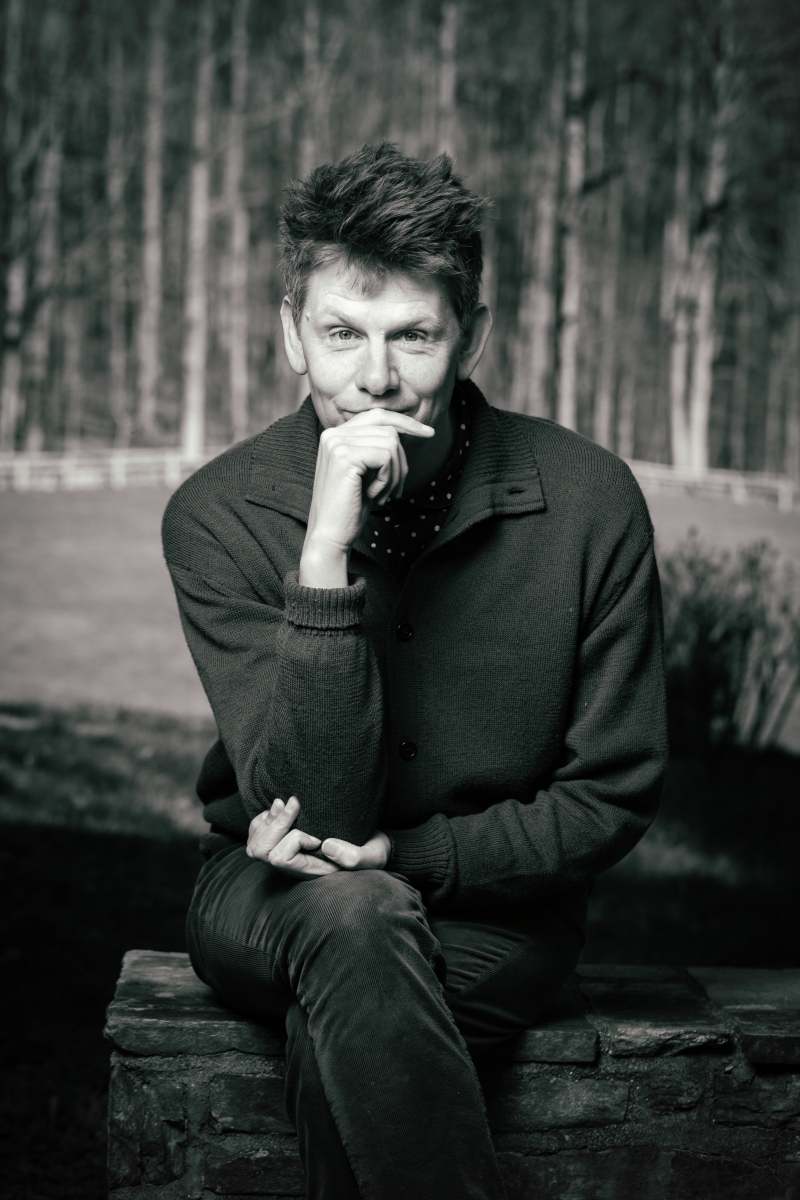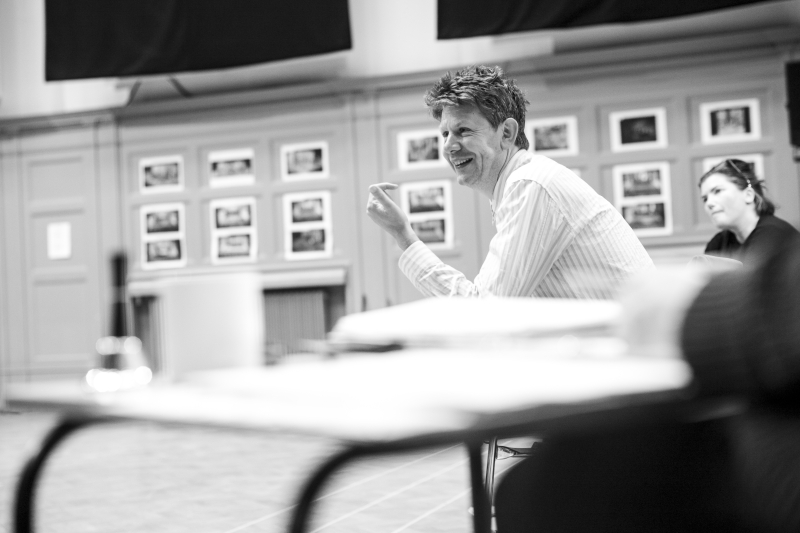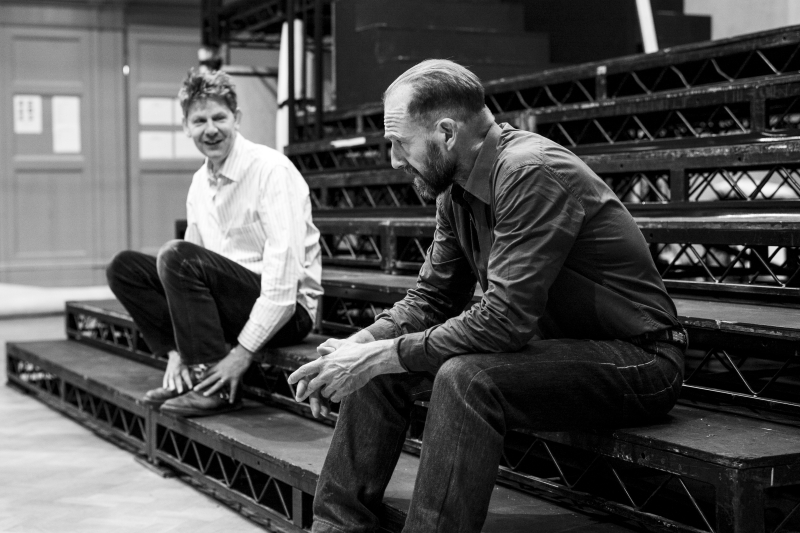Interview: Theatre Life with Simon Godwin
STC's Artistic Director on choosing a season, why Shakespeare remains relevent to today's audiences and more.

Today’s subject Simon Godwin is currently living his theatre life as the Artistic Director of DC’s Tony Award winning Shakespeare Theatre Company (STC). He assumed the position in 2019 succeeding the company’s founder Michael Kahn after a stunning 33-year reign.
Before coming to STC, Simon served as Associate Director of the National Theatre of London, the Royal Court Theatre, the Bristol Old Vic, and the Royal and Derngate Theatres (Northampton). While at the Royal Court, Simon directed seven world premieres, including Routes, If You Don’t Let Us Dream, We Won’t Let You Sleep, NSFW, The Witness, Goodbye to All That, The Acid Test, and Wanderlust. He made his debut at the National Theatre with Strange Interlude followed by Man and Superman, and went on to direct The Beaux’ Stratagem, Twelfth Night, a celebrated production of Antony and Cleopatra with Ralph Fiennes and Sophie Okonedo, and the world premiere of Simon Wood’s Hansard.
Most recently, he returned to the National Theatre to direct Much Ado About Nothing featuring Katherine Parkinson and John Heffernan. He also directed Romeo & Juliet for the National Theatre, an original film for television (Sky Arts in U.K./PBS in U.S.) starring Josh O’Connor and Jessie Buckley.
Simon has also directed at the Royal Shakespeare Company, including productions of Timon of Athens with Kathryn Hunter in the titular role, which was reimagined in early 2020 for Theatre for a New Audience in New York City and Shakespeare Theatre Company, an acclaimed Hamlet, which toured to the Kennedy Center, and The Two Gentlemen of Verona. In 2019, Simon made his Tokyo debut, directing a Japanese cast in Hamlet for Theatre Cocoon. Other productions include The Little Mermaid, Krapp’s Last Tape/A Kind of Alaska, Faith Healer, Far Away, Everyman, Habeas Corpus, and Relatively Speaking. In 2012 Simon was awarded the inaugural Evening Standard/Burberry Award for an Emerging Director.
Simon Godwin is only the second Artistic Director in STC’s 38-year history. Let that sink in for a second. Imagine coming into a position knowing that you are taking over from the person that founded the company. I am sure the pressure must have been something.
So far Simon’s choices of production for STC have included Our Town, which featured an ALL-local company of actors, a site-specific Macbeth starring Ralph Fiennes, Much Ado About Nothing set in a newsroom, The Lehman Trilogy, and let us not forget about the company’s current offering of Mary Zimmerman’s The Matchbox Magic Flute which is running through June 16th.
Shakespeare Theatre Company is and always will be a place for great theatre. The upcoming season is as varied as ever and features something for everyone. Under Simon Godwin’s leadership, the tradition of theatrical excellence will continue.
Simon Godwin continues the legacy of what Michael Kahn started and is doing so in high form. Please consider getting a subscription or seeing a production at STC in the upcoming season. You will then understand why Simon Godwin is truly an artist that is living his theatre life to the fullest.
At what age did you get interested in theatre?
When I was seven, I took part in a local fancy dress parade dressed as a clown. I realized there was something fun about dressing up and becoming somebody different.
Growing up in England, I became a professional actor when I was a teenager and starred in a BBC period drama for families called Five Children and It. It was an exhilarating experience, and, at the same time, my mum was taking me to West End show, including the third preview of The Phantom of the Opea. Seeing Michael Crawford as the original Phantom confirmed my belief that theatre could be a transformative and euphoric ritual.
Where did you receive your training?
When I was 12, I was fortunate enough to join the Anna Scher Theatre, an after-school club for kids in London. Anna was a larger-than-life figure that instilled in us all a passion for acting but also a commitment to being a young professional - to being reliable and believing in the collective power of the group.
I became a director at Cambridge University, where I studied English Literature. And then, in my late 20s, I joined the London International School of Performing Arts to do a physical theatre-based training for two years. But as a director, the training continues throughout your life. Every time I direct a show, new experiences teach me new things.
What was your first professional job working in the theatre?
After leaving university I began directing on the London fringe. I founded a theatre company called Stray Dogs and we produced a little-known 18th century opera called Inkle and Yarico at the Battersea Arts Centre. I remembered Peter Brook’s excellent advice “work attracts work.” Gradually one show led to another.
The first time I had a real job was when I became an associate director of a theatre in Northampton, a regional English city. That was exciting, finally to have a desk and a salary and a long-term relationship with a community and a city.

Your directorial credits include everything from Shakespeare to world premieres. Can you please talk about your process in creating a production? Is it the same regardless of what the show is?
The variety of experience that you have as a director is part of what makes the job so interesting, no two jobs are the same. Every play is like a person: it requires a different language, a different attitude, a different approach. And yet the aim is often similar, i.e. to create a living, breathing, accessible experience for an audience.
I always start with table work, whether it's Shakespeare or a new play. I begin by trying to generate a feeling of communal ownership as well as a deep analysis of the material. By osmosis the actors can feel the impulses of the playwright becoming their own. In the end, embodying language is what rehearsals are for.
How did you come to STC?
Well, I had been working as an associate director in London at the National Theatre, where I'd been directing a lot of Shakespeare. When STC was searching for a new artistic director, the board reached out to me about whether I would be interested in applying.
I had come to Washington once before, as a student at Cambridge University. We had bought a student production of Hamlet to play at Georgetown University for three nights so Shakespeare and the city had always been linked in my mind. After interviews with the staff and the search committee, I was offered the job and arrived in Washington to build on the legacy of Michael Kahn and to begin a new chapter in the history of STC.
As an Artistic Director, one of your biggest tasks is choosing a season? Can you please talk about how you went about picking the shows for STC’S 24/25 season? Is it a team effort?
At STC, a collection of voices informs the work we make.
That means having engaged conversations with my associate directors, Whitney White and Soyica Colbert, and talking to my colleagues in the artistic team, LeeAnét Noble, Drew Lichtenberg and Danica Rodriguez.
I also respond to the dreams of actors that I respect and feel excited by. For example, it was Ralph Fiennes wanting to play Macbeth that led to Ralph and Indira Varma and I doing that play together. It was discovering that Hugh Bonneville had a dream of playing Uncle Vanya that led to that collaboration. Or that Matthew Broderick was excited about revisiting Babbitt or that John Kani was ready to take his breathtaking play Kunene and The King to America.
The DC theatre community has a rich pool of performers, directors, and designers. Can you please tell us what your commitment is when it comes to using local talent for STC productions?
Washington, DC is an amazing theatre town and Shakespeare Theatre Company has been lucky enough to work with the remarkable artists here for many decades. I've been thrilled over the last five years to get to know the artistic community of DC and STC is passionate about celebrating and representing Washington DC on our stages alongside amazing artists drawn from across the world.

Photo by Matt Humphrey.
You have directed many productions of Shakespeare’s plays. What would you say is your favorite production of a Shakespeare play you have worked on
Well, my recent journey with Macbeth was quite unlike anything I'd experienced before. It was a joy working with Ralph and Indira and the astonishing cast that surrounded them. It was also particularly interesting to work in non-theatrical spaces. Playing in warehouses in Liverpool, Edinburgh, London, and finally Washington, created a completely new energy and atmosphere. It was exhilarating being challenged by all the opportunities (and provocations) being in found spaces generated.
Why do you think Shakespeare’s plays continue to endure with audiences after hundreds of years?
Shakespeare enshrines space. His ego is nonexistent and his invitation to audiences and artists is incredibly robust - his plays shape themselves around the communities presenting them. Shakespeare is the ultimate facilitator.
Can you please tell us what the rest of 2024 holds in store for you workwise at STC and elsewhere?
I'm particularly excited to be working with Berkeley Rep on Uncle Vanya—this will be the first time that I've made a show in California – before the production comes to Washington DC. I’m also looking forward to developing my relationship with John Kani, who's such an icon of South African theatre. Hosting him in DC will be a privilege. And the season begins with my new version of Comedy of Errors featuring the incomparable Alex Brightman.
Special Thanks to STC's publicist Heather C. Jackson for her assistance in coordinating this interview.
Theatre Life logo designed by Kevin Laughon.
Comments

Videos

.gif)